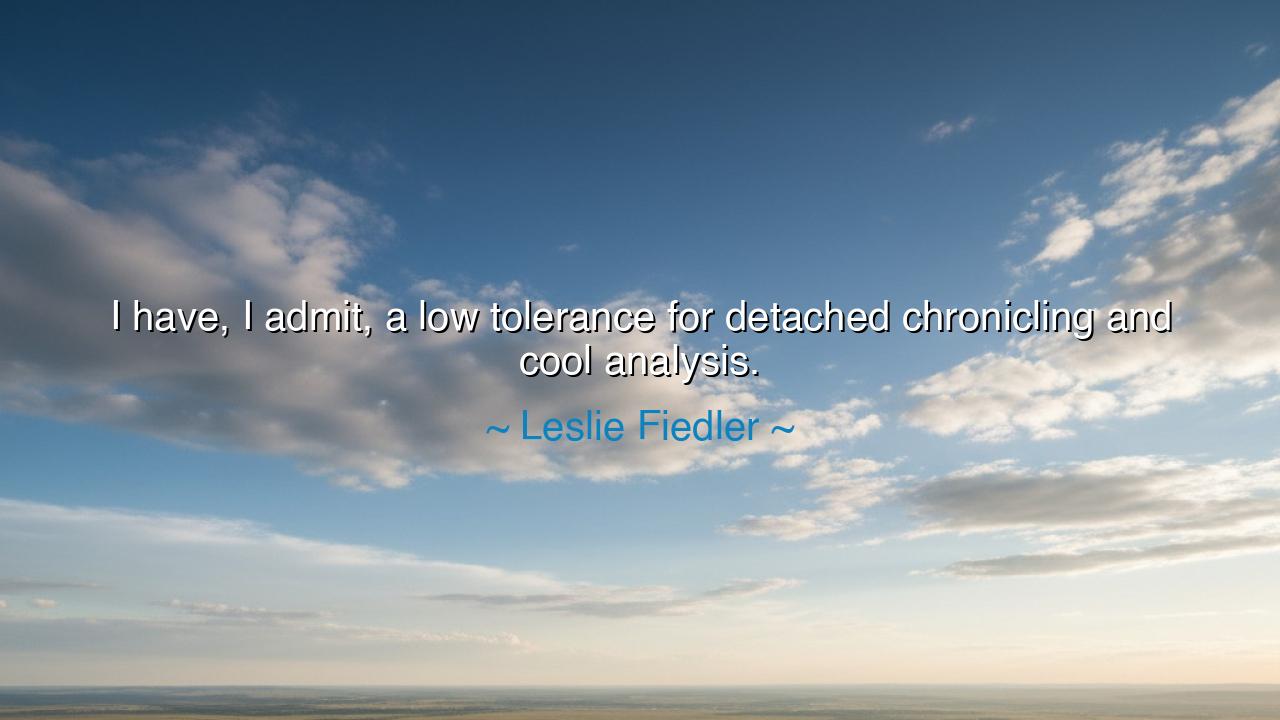
I have, I admit, a low tolerance for detached chronicling and






Leslie Fiedler, in his candid confession, speaks to the heart of a struggle that many of us face: "I have, I admit, a low tolerance for detached chronicling and cool analysis." These words speak not only to Fiedler's own preferences but to a broader truth about the human spirit. Detached chronicling, or the mere recording of events without emotional connection, lacks the passion, the fire that makes life meaningful. It is a call to abandon the sterile, the unemotional, and the dispassionate, in favor of a deeper, more profound engagement with the world around us.
The ancients, too, understood this. Homer, the blind poet of Greece, did not simply chronicle the deeds of the gods and heroes with cold analysis; he infused his epic tales with emotion and drama, weaving together the human experience in all its glory and tragedy. In The Iliad, the great warrior Achilles does not merely fight; he rages, loves, grieves, and ultimately seeks meaning in the face of death. Homer's epic is a vivid, emotional tapestry that transcends the mere events of war, revealing the deep passions that drive human behavior. To tell a story without this depth, Homer would argue, is to rob it of its very essence.
Consider, too, the life of Socrates, whose approach to philosophy was anything but detached. He did not engage in sterile, abstract debates; instead, he questioned, he provoked, and he challenged with a burning desire for truth that consumed him. His pursuit of wisdom was an emotional and passionate endeavor, one that cost him his life but also inspired generations to come. The Socratic method was not about dispassionately analyzing the world, but about engaging with it, about examining the very essence of existence and seeking answers that were as much about the soul as about the mind. This is the kind of connection Fiedler is calling for—authenticity over detachment.
In more recent times, Martin Luther King Jr. embodied this same spirit. He did not speak about justice and equality in clinical terms, nor did he approach his cause with cool detachment. His speeches were filled with passion, emotion, and a deep moral conviction that resonated with millions. His "I Have a Dream" speech is not a detached analysis of civil rights—it is a call to action, a vision of a better world. King understood that the struggle for equality could not be reduced to mere facts or figures; it required an emotional investment, a belief in something greater than oneself, a willingness to suffer for the cause.
The lesson of Fiedler’s words is this: life is not meant to be observed from a distance, nor are the stories of our lives to be told in sterile terms. We must engage with the world fully, with heart and soul. Detached chronicling may offer an accurate account, but it does so at the cost of the truth that lies beneath the surface. Life, like the great epics of the past, is not about the mere facts of existence, but about the emotions, the struggles, and the meaning we derive from them. To live without embracing this emotional truth is to live only half-alive, devoid of the depth that makes human existence so rich and meaningful.
So, the challenge is clear: engage deeply with life, and with the stories you encounter, whether they are your own or those of others. Do not shy away from the emotional complexity of existence, nor from the passions that drive us. Just as Homer’s heroes are not defined by their deeds alone but by the emotions that shape them, so too should we live—by embracing both the joys and sorrows that make us human. Let us not be content with cool analysis, but seek to understand the world through the lens of emotion and connection, for in this, we find the true richness of life.
The practical action, then, is this: when you face a challenge, when you tell a story, when you engage with the world, do so with emotion, passion, and conviction. Allow yourself to be moved, to be alive in the moment, and to see beyond the surface. The detached observer may know the facts, but only the engaged participant knows the true meaning.






AAdministratorAdministrator
Welcome, honored guests. Please leave a comment, we will respond soon